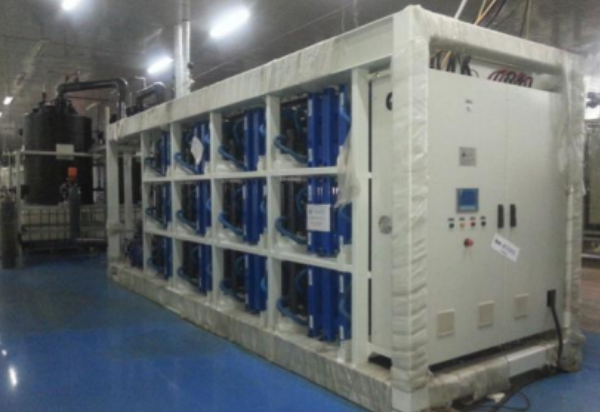Mianyan Huang, the newly appointed president of Pu Neng’s China operations, said the HPX investment would support the deployment of its vanadium battery storage technologies at utility-scale solar and wind projects throughout the country, as well as rural microgrid installations. ”We are ready to meet the need for low-cost energy storage in China,” Huang said in an online statement.
Pu Neng — which recently started selling its new Gen2 vanadium redox battery storage system — successfully wrapped up testing this year on an 8 MWh battery it installed at a solar/wind project that Chinese utility State Grid is operating near Beijing in Zhangbei, Hebei province. The company — formerly known as Prudent Energy — claims it has installed more than 20 MWh of systems throughout the world. It offers proprietary membrane, electrolyte and cell stack designs for flow technologies, which store energy in tanks of liquid electrolyte next to the cathode and anode cell stacks of batteries. Electrolyte passes over membranes in the stacks, adding and removing electrons in a chemical process that Pu Neng claims can be repeated almost infinitely.
“While lithium-based batteries are well suited to consumer electronics and electric vehicles, their lifetimes can be limited,” the company said, claiming that its vanadium redox batteries can withstand an “almost unlimited” amount of recharging. “This is an important factor when matching the daily demands of utility-scale solar and wind power generation.”
Popular content
Vancouver-based HPX — a privately owned investment and exploration firm led by executives from Ivanhoe Mines and Rio Tinto — noted the importance of vanadium production in China. “It has the world's highest-quality vanadium resources,” said Eric Finlayson, president of HPX. “China and Pu Neng will be key contributors in the global transition to a clean energy economy.”
HPX’s investment in Pu Neng underscores growing interest in vanadium redox battery deployment in Asia, with Japan also emerging as a staging ground for a range of pilot projects. Earlier this year, Osaka-based Sumitomo Electric Industries finished installing a 125 kW vanadium redox flow battery in Taiwan. The Taiwan Power Research Institute is using the system to control peak demand and smooth out the variability of renewables such as solar.
This content is protected by copyright and may not be reused. If you want to cooperate with us and would like to reuse some of our content, please contact: editors@pv-magazine.com.


By submitting this form you agree to pv magazine using your data for the purposes of publishing your comment.
Your personal data will only be disclosed or otherwise transmitted to third parties for the purposes of spam filtering or if this is necessary for technical maintenance of the website. Any other transfer to third parties will not take place unless this is justified on the basis of applicable data protection regulations or if pv magazine is legally obliged to do so.
You may revoke this consent at any time with effect for the future, in which case your personal data will be deleted immediately. Otherwise, your data will be deleted if pv magazine has processed your request or the purpose of data storage is fulfilled.
Further information on data privacy can be found in our Data Protection Policy.